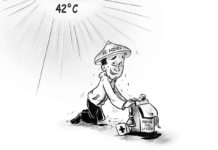
[av_one_full first min_height=” vertical_alignment=” space=” custom_margin=” margin=’0px’ padding=’0px’ border=” border_color=” radius=’0px’ background_color=” src=” background_position=’top left’ background_repeat=’no-repeat’ animation=”]
[av_heading heading=’INTERNATIONAL ILONGGO | ‘Venezuela has changed forever’’ tag=’h3′ style=’blockquote modern-quote’ size=” subheading_active=’subheading_below’ subheading_size=’15’ padding=’10’ color=” custom_font=”]
BY JED JALECO DEL ROSARIO
[/av_heading]
[av_textblock size=” font_color=’custom’ color=”]
Sunday, April 9, 2017
[/av_textblock]
[av_textblock size=” font_color=” color=”]
SHORTLY after claiming to have won a referendum, Venezuelan president Hugo Chavez once said, “Venezuela has changed forever.” Such words are appropriate for the Venezuela of 2017.
President Nicolas Maduro’s Venezuela is in a state of chaos, and from what we’ve seen so far, it’s likely to get worse in the foreseeable future.
You see, the country’s Supreme Court has recently taken the legislative powers of the National Assembly for themselves.
Why did this happen?
Apparently, the Supreme Court is filled with government loyalists, whereas the National Assembly is primarily occupied by the opposition. So the judiciary’s actions are clearly politically-motivated.
The ruling party of Venezuela is the United Socialist Party, and their members occupy both the Judicial and Executive branches government. The only exception is – or rather was – the legislative body, but after the so-called coup of the Supreme Court, the United Socialist Party has now entrenched itself on all branches of the Venezuelan government.
Needless to say, the coup has sparked outrage, not only among Venezuelans but also among other Latin American countries. Already opposition leaders are calling President Maduro’s administration “a dictatorship” while the Organization of American States has condemned the act, calling it the “final blow to democracy in the country.”
As bad as the situation may be, however, it’s important to point out that this political spat between Venezuela’s legislative and judicial bodies is only the latest chapter in the country’s long list of problems. Aside from the ongoing political turmoil, Venezuela is suffering from severe economic problems. The country is currently suffering from severe shortages of food and medicine, and its inflation rate is expected to rise over 1,600 percent this year alone.
No, you’re reading that right: 1,600 percent inflation. So as poor as the Philippines may be, be thankful that inflation forecasts for our country in 2017 only averages to around three percent.
Politics aside, however, Venezuela’s economic problems originated from a wide variety of factors, most notably an over-reliance on the local oil industry as well as unstable oil subsidies. As one of the leading oil exporters in the world, this policy worked well during those years when oil demand was still high, but after oil prices fell down around mid-2014, Venezuela was hurt pretty badly, and it continues to be a mess to this day.
Venezuela, therefore, is a mess both politically and economically, but what lessons can Filipinos take from this situation?
There are certainly plenty to choose from. I could discuss the effects of Maduro and Chavez’s socialist policies. I could also discuss the repercussions of subsidizing major industries, the dangers of an extraction based economy or even the complexities of one branch of the government co-opting another.
However, these things miss the bigger picture, which is that Venezuelan society has turned on itself. The Judicial branch of the Venezuelan government turned on the National Assembly, because it saw them as enemies in a zero sum competition, and not as fellow citizens with differing opinions.
Political leaders – both elected and unelected – also became proxies for competing groups who hate and despise each other, and thus society spirals into chaos.
The big lesson Venezuela, therefore, is not this or that policy, but how far a once stable country can quickly descend to chaos in a span of a few years.
Years ago, pundits once claimed that Venezuela’s ex-President, Hugo Chavez had achieved an economic miracle. Today, many are calling it a failed state. And if such a rapid transformation can happen to Venezuela, it can potentially happen to any country. That is the important lesson.
Yes, Venezuela has changed indeed./PN
[/av_textblock]
[/av_one_full]



